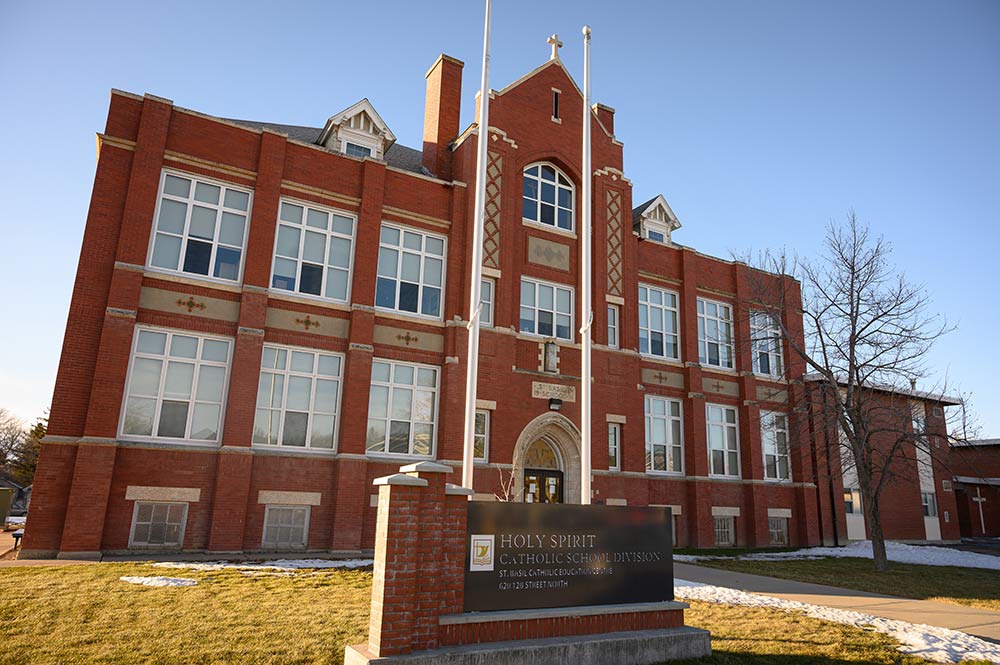As part of the global Church’s preparation for the 2023 assembly of the Synod of Bishops each diocese throughout the world has summarized their experience of the first phase of reflection and dialogue on Church: Communion, Participation, and Mission (“synodal process”). It was a process of prayer, listening, and dialogue in each local Church guided by the Holy Spirit. In the Assembly of Western Catholic Bishops (AWCB) Synod Synthesis report the importance of faith education, formation and catechesis. “Access to Catholic Schools is varied from province to province, but where schools exist, they are generally expected to be responsible for catechesis. Greater collaboration between parish and school is needed to assist parents in assuming this role.” In order to achieve this goal, the report states, “suggestions focus on improving faith formation in Catholic schools, strengthening the connection between schools and parishes, and supporting school teachers in living their faith”.
In 2022 during this first phase of the Synod, the Congregation for Catholic Education also issued an Instruction entitled The Identity of the Catholic School for a Culture of Dialogue. It re-affirms the important role of Catholic schools in the mission of the Church and those fundamental principles which guide Christian education. Education is first and foremost a universal right, its goal is the formation of the human person in achieving their ultimate end, it must serve the good of society, it is the responsibility of all but parents have this as their first priority, and the support of this by the State should enable families “to choose a school and an educational project” (no.12) for their children.
The evangelizing mission of the Church and the integral development of the human person is intertwined in the raison d’etre of the Catholic school. A fundamental element being the initial and permanent formation of teachers, the mutual cooperation and collaboration of teachers, parents, trustees to establish an educational community that is centred on Jesus Christ. A distinctive feature of its identity in the mission of the Church “is that it is a school for all, especially the weakest” (no.22).
In the face of rapid secular changes, globalization and the growth of interreligious and intercultural dialogue, the Catholic identity of our schools requires a renewed intentionality and focus, which would benefit from prayer, reflection and listening based on the themes of the synodal process. However, as Pope Francis stated, “We cannot create a culture of dialogue if we do not have identity”.
This Instruction is divided into three sections. The first offers a good summary of the historical and dynamic identity of the Catholic school, the importance of educating students for dialogue in promoting a future culture of care. The second section outlines the many individuals and their roles of collaboration in promoting and ensuring the Catholic identity of schools. It envisions school leaders, teachers, administrators and trustees, the central role of the Bishop to discern the “Catholic” identity of the school to ensure its unity and communion with the Church. The final section is very practical. It provides prudential guidance on critical issues: divergent interpretations of the term “Catholic”, ensuring competency for all those responsible in the mission of Catholic schools, supporting their preparation and witness to a life of faith, legislation and policies to protect the Catholic identity of the school, how to address conflicts and sensitive issues by creating a process of encounter and convergence that serves to consolidate and establish an authentic Catholic identity. One that focuses on building unity and developing real and lasting solutions.
The Instruction is not a “general or a comprehensive treatise on the subject of Catholic identity, but rather an intentionally concise and practical tool that can help to clarify certain current issues and, above all, prevent conflicts and divisions in the critical area of education.” (no. 7) The Catholic Trustees of Alberta have a unique opportunity through this Instruction to reflect on this critical topic, to use it as guide, and – through prayer, listening and dialogue – to discern and re-envision their role of leadership role at both the local and provincial level that would truly serve to strengthen the Catholic identity of our schools. Similar to the synodal process, this can potentially create the experience of “walking together” as Catholic trustees, and offer a strong and united witness of leadership on behalf of the Church in the field of Catholic education in Alberta. In an increasingly fragmented and conflicted world, our Catholic schools can “contribute both to the evangelising mission entrusted to her by Jesus and to the construction of a world in which human persons feel they are brothers and sisters.” (no. 7)




